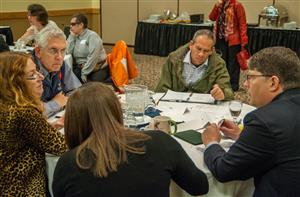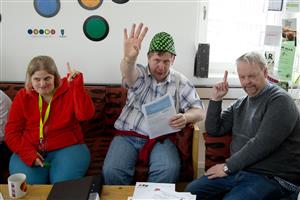Search Results
Search
Filter results
Advanced Filters
Your search returned 43 Solutions
-
Independent and secret voting for all
The Federation of Portuguese Cerebral Palsy Associations (FAPPC), together with IBM and Softinsa, has developed a voting system that uses different input devices to enable independent and secret voting for everyone, including people with motor, sensory, and intellectual disabilities.
FAPPC - Portuguese Federation of Associations for Cerebral Palsy, Accessible Vote System, Portugal -
Voting independently and privately
eVoting improves access for the impaired as well as for the illiterate and citizens living abroad. The voting software was customized to support 12 languages, and included zoom and contrasting options on the kiosk screen and an audio interface. It also offers such additional features as headphones and a specially selected keyboard.
Scytl, Australia -
Enfranchising people under guardianship
Till 2013 Japan’s Election Law deprived people under adult guardianship of their right to vote and to stand for elections. In a spectacular court case, the Tokyo District Court condemned this as unconstitutional. The repeal of the discriminatory article led to the enfranchisement of more than 136,000 persons.
Tokyo District Court, REVISION OF ELECTION LAW, Japan -
Voting without legal capacity
The project brought together a variety of civil society organizations to raise public awareness on the rights of persons with disabilities and to provide workshops on democratic and voting procedures for self-advocates in local communities. The main objectives realized by the project were making changes to the Voters Register Act.
Association for Self Advocacy, Croatia -

An Accessibility Implementation Plan for Provincial Elections
The plan addresses four problematic areas that had been identified through focus groups and consultations: voting options, polling place accessibility, products and services at polling stations, voter information and public education. Solutions carried out include improved polling place accessibility or homebound voting.
Elections Saskatchewan, Canada -
Voting and participating in the electoral process
With its two regulations, Spain has introduced a voting procedure for blind electors as well as basic conditions of accessibility and non-discrimination for persons with disabilities to participate in elections and political life. This latter legislation is a broader policy framework aimed at improving the implementation of participatory rights.
Spanish Ministry of Home Affairs, Department on Electoral Cooperation, ROYAL DECREE 1612/2007 ON AN ACCESSIBLE VOTING PROCEDURE FOR PEOPLE WITH VISUAL DISABILITIES & ROYAL DECREE 422/2011 ON THE CONDITIONS FOR THE PARTICIPATION OF PERSONS WITH DISABILITIES IN POLITICAL AND ELECTORAL PROCESSES, Spain -
Empowering Individuals in their Right to Vote
ENABLE Scotland and the UK Electoral Commission have jointly developed easy-read guides to support people with learning disabilities to vote, plus voting factsheets for family members and support workers. In addition, workshops and events are organised where people with learning disabilities meet their local politicians.
ENABLE Scotland, #ENABLEtheVote, United Kingdom -
Increasing Voter Accessibility in Paraguay
Ahead of the 2015 municipal elections, USAID and Fundación Saraki reviewed the legal framework regarding accessibility in elections. Their recommendations led to new regulations, such as providing absentee ballots for the first time and making information about voting available in sign language and Braille.
USAID - United States Agency for International Development, Bureau for Policy, Planning, and Learning, Paraguay -
Enabling people with disabilities to vote from home and without assistance
In partnership with Amazon and Microsoft, Democracy Live developed OmniBallot, an accessible online voting system available via computer, tablet, or smartphone, thus enabling people with disabilities to vote independent of support. Since its launch in 2015, over one million voters have used the system.
Democracylive, OmniBallot, United States of America -

Study circles for persons with intellectual disabilities to engage in voting
Small study circle groups learn from easy-read materials and DAISY-formatted audio texts that describe Swedish democracy and the voting process. A group leader assists by fielding questions to politicians and arranging discussions. For the 2018 election there were 109 study circles, totalling some 650 people in 80 municipalities.
SV Study Association Vuxenskolan, My choice/My election, Sweden